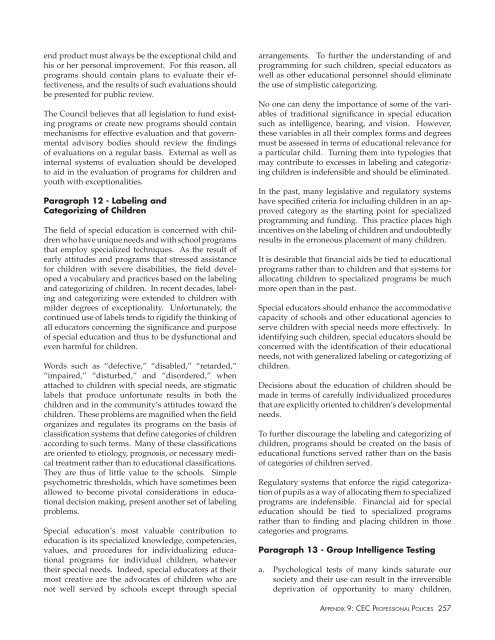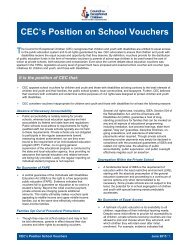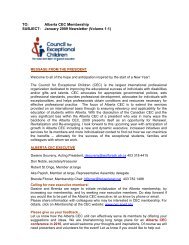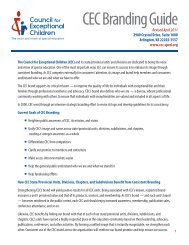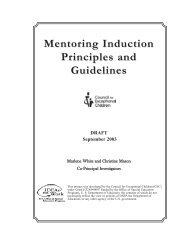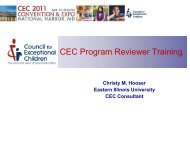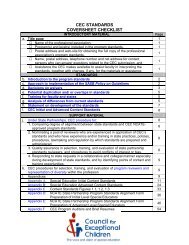What Every Must Know Special Educator - Council for Exceptional ...
What Every Must Know Special Educator - Council for Exceptional ...
What Every Must Know Special Educator - Council for Exceptional ...
Create successful ePaper yourself
Turn your PDF publications into a flip-book with our unique Google optimized e-Paper software.
end product must always be the exceptional child and<br />
his or her personal improvement. For this reason, all<br />
programs should contain plans to evaluate their effectiveness,<br />
and the results of such evaluations should<br />
be presented <strong>for</strong> public review.<br />
The <strong>Council</strong> believes that all legislation to fund existing<br />
programs or create new programs should contain<br />
mechanisms <strong>for</strong> effective evaluation and that governmental<br />
advisory bodies should review the findings<br />
of evaluations on a regular basis. External as well as<br />
internal systems of evaluation should be developed<br />
to aid in the evaluation of programs <strong>for</strong> children and<br />
youth with exceptionalities.<br />
Paragraph 12 - Labeling and<br />
Categorizing of Children<br />
The field of special education is concerned with children<br />
who have unique needs and with school programs<br />
that employ specialized techniques. As the result of<br />
early attitudes and programs that stressed assistance<br />
<strong>for</strong> children with severe disabilities, the field developed<br />
a vocabulary and practices based on the labeling<br />
and categorizing of children. In recent decades, labeling<br />
and categorizing were extended to children with<br />
milder degrees of exceptionality. Un<strong>for</strong>tunately, the<br />
continued use of labels tends to rigidify the thinking of<br />
all educators concerning the significance and purpose<br />
of special education and thus to be dysfunctional and<br />
even harmful <strong>for</strong> children.<br />
Words such as “defective,” “disabled,” “retarded,”<br />
“impaired,” “disturbed,” and “disordered,” when<br />
attached to children with special needs, are stigmatic<br />
labels that produce un<strong>for</strong>tunate results in both the<br />
children and in the community’s attitudes toward the<br />
children. These problems are magnified when the field<br />
organizes and regulates its programs on the basis of<br />
classification systems that define categories of children<br />
according to such terms. Many of these classifications<br />
are oriented to etiology, prognosis, or necessary medical<br />
treatment rather than to educational classifications.<br />
They are thus of little value to the schools. Simple<br />
psychometric thresholds, which have sometimes been<br />
allowed to become pivotal considerations in educational<br />
decision making, present another set of labeling<br />
problems.<br />
<strong>Special</strong> education’s most valuable contribution to<br />
education is its specialized knowledge, competencies,<br />
values, and procedures <strong>for</strong> individualizing educational<br />
programs <strong>for</strong> individual children, whatever<br />
their special needs. Indeed, special educators at their<br />
most creative are the advocates of children who are<br />
not well served by schools except through special<br />
arrangements. To further the understanding of and<br />
programming <strong>for</strong> such children, special educators as<br />
well as other educational personnel should eliminate<br />
the use of simplistic categorizing.<br />
No one can deny the importance of some of the variables<br />
of traditional significance in special education<br />
such as intelligence, hearing, and vision. However,<br />
these variables in all their complex <strong>for</strong>ms and degrees<br />
must be assessed in terms of educational relevance <strong>for</strong><br />
a particular child. Turning them into typologies that<br />
may contribute to excesses in labeling and categorizing<br />
children is indefensible and should be eliminated.<br />
In the past, many legislative and regulatory systems<br />
have specified criteria <strong>for</strong> including children in an approved<br />
category as the starting point <strong>for</strong> specialized<br />
programming and funding. This practice places high<br />
incentives on the labeling of children and undoubtedly<br />
results in the erroneous placement of many children.<br />
It is desirable that financial aids be tied to educational<br />
programs rather than to children and that systems <strong>for</strong><br />
allocating children to specialized programs be much<br />
more open than in the past.<br />
<strong>Special</strong> educators should enhance the accommodative<br />
capacity of schools and other educational agencies to<br />
serve children with special needs more effectively. In<br />
identifying such children, special educators should be<br />
concerned with the identification of their educational<br />
needs, not with generalized labeling or categorizing of<br />
children.<br />
Decisions about the education of children should be<br />
made in terms of carefully individualized procedures<br />
that are explicitly oriented to children’s developmental<br />
needs.<br />
To further discourage the labeling and categorizing of<br />
children, programs should be created on the basis of<br />
educational functions served rather than on the basis<br />
of categories of children served.<br />
Regulatory systems that en<strong>for</strong>ce the rigid categorization<br />
of pupils as a way of allocating them to specialized<br />
programs are indefensible. Financial aid <strong>for</strong> special<br />
education should be tied to specialized programs<br />
rather than to finding and placing children in those<br />
categories and programs.<br />
Paragraph 13 - Group Intelligence Testing<br />
a. Psychological tests of many kinds saturate our<br />
society and their use can result in the irreversible<br />
deprivation of opportunity to many children,<br />
Appendix 9: CeC profeSSionAl poliCieS 257


